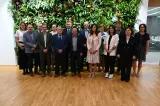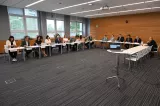Published: 15.07.2025
In June, the University of Pardubice hosted a visit from members of the International Evaluation Panel as part of the national evaluation of research organizations. This evaluation, based on the HEI2025+ Evaluation Guidelines, combines both qualitative and quantitative methods to promote quality and strengthen the international competitiveness of Czech higher education institutions.
The evaluation framework consists of five modules (M1–M5). Two of these—Module 1 (Quality of Selected Results) and Module 2 (Research Performance)—are assessed annually. A comprehensive evaluation involving all five modules is conducted every five years by the International Evaluation Panel. On-site visits are a vital component of this process, as they enrich the written materials with direct experience of the institution’s academic and research environment. The outcomes of these visits contribute to the overall assessment of each institution’s research environment.
The panel was chaired by Professor Miroslav Červinka from the Charles University Faculty of Medicine in Hradec Králové and included Czech and international experts from various research fields. A complete list of panel members can be found here: www.upce.cz/en/upce/international-evaluation-panel-2025.
The three-day visit followed an intensive schedule, including meetings with University management, as well as Deans and Vice-Deans from all seven faculties. Each faculty presented its research activities and participated in discussions related to Module 3 (Social Relevance). Conversations within Module 4 (Viability) focused on doctoral studies—particularly reforms and funding, English-language programs, and the mentoring scheme. Supporting PhD students remains a long-term strategic priority for the University.
As part of Module 5 (Strategy and Policies), the University presented its long-term vision, funding strategies for research and teaching, data storage systems, and quality-focused strategic plans. The Centre for Technology and Knowledge Transfer showcased its robust system for commercializing research outcomes, managing intellectual property, supporting the creation of spin-off companies, and fostering collaboration with industry.
The panel also toured several research sites and departments. These included Professor Michal Holčapek’s team at the Faculty of Chemical Technology, the Educational and Research Centre in Transport in Doubravice, the Faculty of Electrical Engineering and Informatics, the Center of Materials and Nanotechnologies (CEMNAT), the training operating theatre at the Faculty of Health Studies, and the studios at the Faculty of Restoration in Litomyšl.
“This visit marks an important milestone in the national evaluation process,” said Professor Libor Čapek, Rector of the University of Pardubice. “The panel appreciated the openness and engagement of all parts of the University, as well as the quality of the research activities.”
The agenda also included a presentation of the University’s strategic research plan, internal evaluation mechanisms, and use of analytical tools for research management. The panel engaged in discussions about human resources, support for early-career researchers, and the University’s ongoing emphasis on delivering high-quality, respected education. A dedicated session with students provided valuable insights into their academic experience, research involvement, and participation in international mobility programs.


